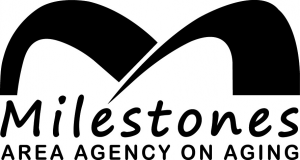April 1, 2022
April is Stress Awareness Month
 By Mike Mathews
By Mike Mathews
Milestones Area Agency on Aging
At any age, stress is a part of life. Young and old alike must face difficult situations and overcome obstacles. While young adults struggle to establish a career, achieve financial security, or juggle work and family demands, older adults may face different life changes that can be equally as stressful. Changes of lifestyle and financial status after retirement, caring for grandchildren, or a sick spouse or death of loved ones can all take their toll. Simply the challenges of retaining their independence can put some older adults into a stressful state.
The body’s physical reaction to stress can be particularly harmful for older adults. When the brain senses stress, it triggers the need for the body to react. It causes muscles to tighten and signals the adrenal glands to release stress hormones—such as adrenaline and cortisol. Those hormones make you breathe faster, getting more oxygen to your muscles, and they trigger the release of sugar and fat into the blood, giving your cells more energy. To accommodate these needs, your heart beats faster and your blood pressure goes up. These physical changes are all part of the stress response.
This routine isn’t harmful if it occurs once in a while. But if you put your body through those paces frequently, or even constantly, you may suffer a cascade of dangerous and sometimes lasting effects such as high blood pressure, a weakened immune system, anxiety, depression, insomnia, heartburn, indigestion, and an increased risk for heart disease.
Unfortunately, the body’s natural defenses against stress gradually break down with age. But you don’t have to give in to stress just because you’re no longer young. Learning to manage and reduce your stress load can help give you a better chance to live a long, healthy life.
A large part of stress management focuses on triggering the opposite of the stress response: the relaxation response, which helps lower blood pressure, heart rate, breathing rate, oxygen consumption, and stress hormones.
Tips for reducing stress as we age include:
- Increasing mindfulness (meditation)
- Exercising regularly
- Engaging in subtler forms of body manipulation like Tai Chi and massage
- Becoming active within your community and increasing socialization
- Eating nutritionally dense foods and avoid sugar
One of these methods may help reduce stress in the short term, but it’s important to our lasting health that we engage in all of them to some degree. The effect of stress on the body is cumulative, but so are the efforts to reduce this stress. The longer we engage in these stress relieving activities, the more positive their overall impact. This also means that there is no better time to start than today.
Milestones Area Agency on Aging offers a variety of Wellness and Support Programs for older adults. To learn more, visit www.milestonesaaa.org.
Filed Under: Health & Wellness, News, Personal Growth
Trackback URL: https://www.50pluslife.com/2022/04/01/april-is-stress-awareness-month/trackback/


